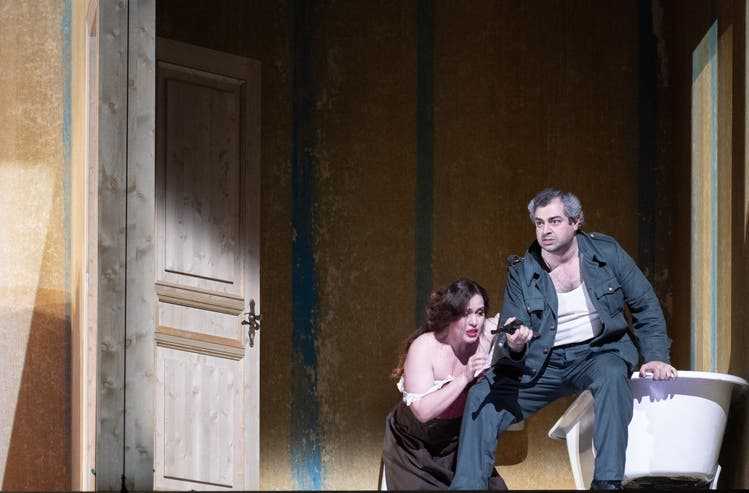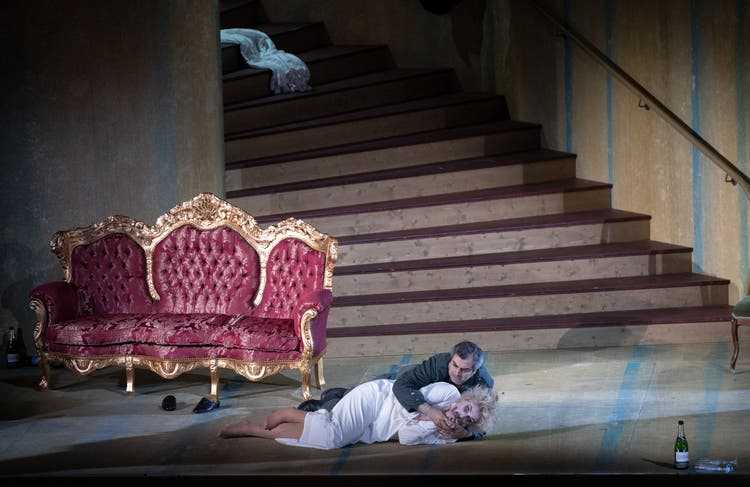Kirill Petrenko and the Berlin Philharmonic put Russian music at the center of the Easter Festival in Baden-Baden. A gala with Anna Netrebko was also planned. Unintentionally, this festival sums up the current dilemma of the cultural world.
The Countess (Doris Soffel) reveals to Hermann (Arsen Soghomonyan) in a nocturnal apparition the supposedly surefire playing cards three, seven and ace.
So that was it, the example: Would a large-scale music festival with a focus on Russian composers meet with resistance in these times? Would the audience come at all? Would there even be protests? The Berliner Philharmoniker and their chief conductor Kirill Petrenko were faced with such questions at the traditional Easter Festival, which the Festspielhaus Baden-Baden has been organizing with the leading German orchestra since 2013. Because far beyond the world of music, the public debate on Russian culture is currently being viewed with suspicion.
After the first unsuccessful actions shortly after the outbreak of war, in which, for example, texts by Dostoyevsky or compositions by Shostakovich were removed from the curricula and programs, a majority in the West quickly agreed that such cultural censorship was not only undemocratic, but simply nonsensical. Because a novel or an opera may have an unsuitable subject or a problematic historical context – to hold them responsible for the aggressive war of the incumbent Russian ruler, on the other hand, seems as tendentious as it is absurd.
However, even well-meaning organizers forget the perspective of the audience: We, the recipients, never listen to music in isolation from the context of our own lives. A performance of Shostakovich’s “Leningrader”, which officially deals with the attack by the Wehrmacht on the Soviet Union, may evoke completely different associations under the impression of the events. This applies even more drastically to the final piece of Mussorgsky’s “Pictures at an Exhibition”, which, as is well known, depicts the “Great Gate of Kyiv” in all its splendor and splendor. But how would Tchaikovsky’s opera «Pique Dame», the heart of this year’s Easter Festival, appear against this horizon?
Way out «L’art pour l’art»?
The Baden new production of this stage version of the novel of the same name by Alexander Puschkin largely dispenses with updates. That would be a legitimate approach, but the production by the directing duo Moshe Leiser and Patrice Caurier abstains from all clear interpretational accents. Apart from the strange idea that all the female protagonists in the play obviously work in a high-end 19th-century brothel, while the men mostly walk around in uniforms and drink vodka.

Lisa (Elena Stikhina) tries in vain to dissuade Hermann (Arsen Soghomonyan) from his gambling mania.
The drama of the gambling addict Hermann, who gambles away his love and his mind on the hunt for three surefire winning cards, is hardly tangible against this very clichéd background. But even as a portrayal of tsarist Russia, the staging seems too tame because it carefully avoids any political exaggeration. The result is L’art pour l’art, unquestionably elaborate in design and beautiful to look at, but without any deeper relevance to the play, let alone to the present day. The last Salzburg production by Hans Neuenfels or Stefan Herheim’s virtuoso merging of the plot with Tchaikovsky’s life in Amsterdam have shown how much more is possible with this opera.
The focus of attention is soon directed to the orchestra pit, where Petrenko and the Berlin Philharmonic tell the story of love, betrayal and obsession in a far more exciting way. The fact that the Philharmonic is an outstanding concert orchestra, but not an experienced opera orchestra, has a positive effect in this case, because Petrenko is also more interested in the paws of the great symphonist Tchaikovsky, which can be felt in almost every bar of this score, than for superficially operatic effects.
Petrenko’s accuracy and the Philharmoniker’s technical brilliance bring such a wealth of details and nuances to light that one can get the impression that the entire plot is contained in a plastic, eloquent soundtrack that hardly needs the set design, i.e. the stage. Unlike the production, however, this elaborate reading hardly runs into the danger of a self-sufficient L’art pour l’art, because the consistently strong singers around Arsen Soghomonyan as Hermann and the touching Elena Stikhina as Lisa provide the necessary immediacy and gripping emotional states of tension.

In his attempt to snatch the secret of the three cards from the Countess (Doris Soffel), Hermann (Arsen Soghomonyan) does not even shy away from violence.
The audience in the well-attended but not sold-out Festspielhaus received the production mostly with goodwill, but above all they celebrated Petrenko for his intense reading. It certainly also plays a role that the native Russian took an exemplary stand against the war and against Putin the day after the attack on Ukraine. In the case of Anna Netrebko, who was supposed to appear at a gala concert with Petrenko, the music world is still waiting for a similarly clear distancing, even if the soprano has at least specified her fundamental rejection of the war after a wave of disinvitations by Western organizers.
debris of a gala
Nevertheless, Netrebko did not perform in Baden-Baden – a mutually negotiated waiver, as the Festspielhaus emphasized, not a unilateral rejection. However, Petrenko also withdrew his participation in the gala because he wanted to concentrate his strength on the four performances of “The Queen of Spades” after recovering from an illness shortly before. Andris Nelsons took on the thankless task of turning the ruins of the gala program into a coherent evening.
He coped convincingly with Thomas Hampson and other stand-ins, namely with Stravinsky’s “Firebird” at the end; admittedly without the glowing intensity that is otherwise usual with him. Russian music – the two evenings unintentionally showed this clearly – can and should of course continue to be played; more than ever, however, the integrity and the personal power of persuasion of the interpreters are important. This repertoire will remain tricky for all those involved for years to come.
Next year, the Berliner Philharmoniker want to devote themselves to Richard Strauss’s “Frau ohne Schatten” at the festival; the new Lucerne Opera Director Lydia Steier is responsible for the production.
